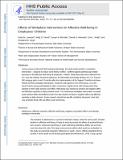Effects of workplace intervention on affective well-being in employees’ children.
Author(s)
Lawson, Katie M.; Davis, Kelly D.; McHale, Susan M.; Almeida, David M.; Kelly, Erin L.; King, Rosalind B.; ... Show more Show less
Downloadnihms-764861.pdf (215.7Kb)
Terms of use
Metadata
Show full item recordAbstract
Using a group-randomized field experimental design, this study tested whether a workplace intervention-designed to reduce work-family conflict- buffered against potential age-related decreases in the affective well-being of employees' children. Daily diary data were collected from 9- to 17-year-old children of parents working in an information technology division of a U.S. Fortune 500 company prior to and 12 months after the implementation of the Support-Transform-Achieve-Results (STAR) workplace intervention. Youth (62 with parents in the STAR group, 41 in the usual-practice group) participated in 8 consecutive nightly phone calls, during which they reported on their daily stressors and affect. Well-being was indexed by positive and negative affect and affective reactivity to daily stressful events. The randomized workplace intervention increased youth positive affect and buffered youth from age-related increases in negative affect and affective reactivity to daily stressors. Future research should test specific conditions of parents' work that may penetrate family life and affect youth well-being.
Date issued
2016-05Department
Sloan School of ManagementJournal
Developmental Psychology
Publisher
American Psychological Association (APA)
Citation
Lawson, Katie M. et al. “Effects of Workplace Intervention on Affective Well-Being in Employees’ Children.” Developmental Psychology 52, 5 (2016): 772–777 © 2016 American Psychological Association.
Version: Author's final manuscript
ISSN
1939-0599
0012-1649
Collections
The following license files are associated with this item: